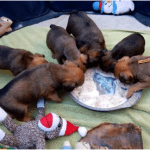Whatever diet you are feeding your dog, it is important to use several animal protein sources. This is what we call variety, and variety helps to make sure a dog is getting all the nutrients they need. Proteins are made from amino acids and each protein source offers different amounts of the 11 amino acids provided by food. Locking your dog into one or two animal protein sources may cause your dog to have deficiencies in one or more of these. Let's look at what amino acids are, why they are important for your dog, and how to keep a good variety of them in your dog's diet.
Amino acids are found in all proteins. But not all proteins are equal. Some amino acids have decreased absorption when fed with a high fiber, plant based (carbohydrates) diet. Plant based proteins are missing some amino acids that are only found in animal based sources. These include l-taurine and l-carnitine. These amino acids are essential for your dog's heart health and these amino acids are easily destroyed by processing and long term, high temperature cooking.
Unlike plant based proteins, animal based proteins contain a complete amino acid profile for dogs. And each type of animal based proteins contains different amounts of each of these. For instance, red meat and heart contain higher amounts of taurine and l-carnitine. While animal based proteins (red meat, organ meat, poultry, dairy and fish) contain all the amino acids needed by dogs, they each have varying amounts of these amino acids. Thus, it is important to use variety of these animal based proteins in the dog's diet.
Animal based proteins are also rich in the minerals zinc and iron, and vitamin B12. Dogs need iron from animal based sources. Foods rich in iron include red meat, eggs and organ meat such as liver and kidney.
If you are feeding a raw diet, please use at least four protein sources, preferably six. An example of a good variety could be chicken, beef, pork and fish. The fish source can be fresh fish (NOT fresh water NW pacific salmon, which can contain parasites) or canned mackerel, sardines or salmon. Additional sources could be yogurt, cottage cheese, eggs, turkey, lamb, duck, venison, elk or buffalo. Be sure to add liver or kidney, at about 5% of the daily diet.

Raw and Natural Nutrition for Dogs, Revised: The Definitive Guide to Homemade Meals!
Lew Olson's newly revised book is filled with an abundance of new topics and information. Whether you are new to home feeding or a seasoned raw feeder, have a senior dog or a new puppy, a pregnant mom or a toy breed, this book presents all the information you need to make the best nutritional decisions for your dog.For cooked diets, be sure not to overcook the meat. I don't recommend crock pot cooking, or roasting meat for long periods. High, sustained heat in cooking can destroy many of the amino acids. Cook the meats lightly. You can freeze recipes for daily portions and it will not harm the amino acid or mineral content in the meats. The same protein sources used in raw diets can also be used for cooked diets.
For those feeding commercial pet foods, be sure to rotate brands of food to insure several protein types. If you are using a chicken based food, switch to a beef based food for the next bag, and rotate with a fish protein food a couple of days of the week. Switching brands frequently means getting more variety in your dog's diet. Ideally, I would suggest adding some fresh protein foods to dry kibble, such as yogurt, eggs, beef, chicken, canned fish, pork and more, to help obtain all the amino acids needed, plus sources of iron, zinc and B12.
To complete the diet, for whatever method you feed, I recommend adding EPA fish oil or Salmon oil capsules to your dog's diet, at one capsule per 20 lbs of body weight daily. This gives your dog the omega 3 fatty acids it needs for healthy coat and skin, immune system support, and renal, heart and liver protection. For additional nutrients that are harder to find in foods, I would also add the Berte’s Daily Blend vitamins. This contains vitamins C, E and B complex, plus vitamin D and A, with kelp and alfalfa added for trace minerals. The Berte’s Daily Blend is flavored with powdered chicken liver, which makes this powder tasty and enticing for your dog.
Providing a variety of proteins in your dog's diet ensures they are getting all the amino acids they need for good health and keeps meal times more interesting with a variety of flavors and textures.
Happy Labor Day to you and your dogs, and here is looking forward to cooler weather!

Rosalie, enjoying a nap after a good meal of chicken necks and pork ribs.
Copyright Lew Olson 2010







